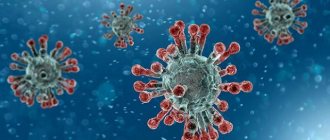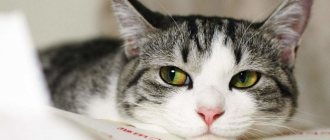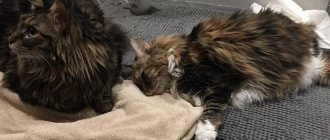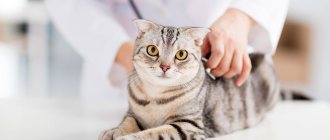Cats have many diseases. Some of them respond well to treatment, some lead to chronic diseases, but with proper therapy the animal can live a long life. Recently, a new threat has emerged - coronavirus. It turns out that not only people get sick from it, but also cats. The only difference is that furry ones get sick in their own way. FIP in cats destroys the immune system and often ends in death.
This disease in cats received its official name around the 60s of the 20th century. Scientists have identified a virus that can destroy the immunity of FIP cats. Its original variant is a harmless strain of coronavirus. Under certain conditions, a mutation occurs, as a result of which FIP or, in other words, infectious peritonitis develops. Scientists do not have a consensus on the origin of the disease. However, one thing is clear. This disease is deadly for cats.
There are many strains of coronavirus that are not dangerous to cats. Moreover, animals are often their carriers. If the immune system fails for any reason, cats die very quickly. There is no cure or accurate diagnosis of the disease.
FIP is most dangerous for kittens around 10 months of age and for older cats. Other age categories of animals are at less risk.
Why is FIP dangerous in cats?
FIP is caused by the FCoV strain of coronavirus (7-10). It causes an immune disease that attacks the immune system. There is another mutation of the FECV strain. This is also a coronavirus, unlike the first one, it causes enteritis. FIP virus or feline infectious peritonitis is a dangerous disease caused by the feline coronavirus FECV.
The danger of the disease is that the virus that causes enteritis contributes to damage to the intestinal epithelium. FIP destroys the immune system. Complications lead to death. They manifest themselves in the form of inflammatory processes in a variety of systems in the body.
What problems can FCoV cause?
Most cats infected with FCoV do not show any symptoms, although some may develop diarrhea that lasts several days. After a few months, the body will completely get rid of the virus, and the cat will remain healthy.
However, in very rare cases, the virus mutates and causes a fatal disease called infectious peritonitis (FIP). Infectious peritonitis develops several weeks or months after infection with FCoV.
If a cat is cleared of FCoV and does not get FIP, does that mean it is immune? Unfortunately no. A cat can become infected with FCoV again, and then there is again a danger that the virus will mutate into FIP.
Etiopathogenesis of the disease in cats
Cats are carriers of various diseases. Including some strains of coronavirus. Strong immunity suppresses them. Therefore, viruses can live for a long time and not show any activity. However, if the immune system malfunctions, cellular defenses are disrupted. The virus enters the body and infection occurs.
The immune system, trying to cope with the virus, releases antibodies. But they cannot cope with the infection. Experts agree that the cause of the animal’s death is not the disease, but the body’s response to the virus.
How is FIP diagnosed?
Diagnosis algorithms recommended by a number of European authors are complex multi-stage sets of studies, including determination of the concentration of globulins in the blood serum and the ratio of albumin to globulin, detection of antibody titer in the blood (ELISA, ICA), detection of antigen (virus) in the blood and feces (PCR, ICA), etc.
Modern laboratory tests for FIP do not yet provide a 100% reliable result. Therefore, the disease can be diagnosed based on symptoms, the results of a medical examination, blood tests, x-rays and analysis of fluid samples from the chest or abdominal cavity, based on the totality of the medical history.
A blood test may reveal antibodies produced in an infected cat's body in response to FCoV, but this does not guarantee an accurate diagnosis, since elevated levels of antibodies may only indicate that the cat was exposed to the virus at some point. This does not mean that the cat necessarily has FIP. On the other hand, some cats affected by FIP do not produce antibodies at all.
Why does coronavirus mutate into FIP?
There is no exact data on the cause of the coronavirus mutation in FIP. However, scientists agree that the provoking factors are:
- Prolonged exposure to a stressful situation. It is very stressful for animals, for example, a change in their usual place of residence, the appearance of new owners;
- Age category. The disease is most often diagnosed in kittens aged six months or older, as well as in older cats over 11 years old;
- Chronic diseases that weaken the immune system. One of the diseases associated with the pathology of the immune system is FIP. The weakening of the body's natural defenses is a provoking factor for mutation.
Can FIP be prevented?
Unfortunately, there are no vaccines against FCoV and FIP in Russia. Only one in ten cats infected with FCoV develops FIP. But if you suspect your cat has been exposed to FCoV, try to minimize stressors in her environment, which may reduce the risk of the virus mutating.
For this purpose, it is advisable to avoid crowding of animals in close quarters. In addition, combinations of stress-related events should be avoided, such as antiparasitic treatment, vaccination, and sterilization at the same time.
It is also advisable to remove feces as quickly as possible, keep food and water bowls away from the litter box, and disinfect the litter box at least twice a week.
Types of FIP in cats
Experts distinguish two types of FIP:
- Wet (acute form);
- Dry (chronic form).
According to statistics, the first variety is most common. A pet can become ill with both forms at the same time.
Types of FIP in cats
| Acute form | Chronic form |
| Refers to the wet type. The vessels are damaged, a transudate is formed, which enters the cavities of the peritoneum, pericardium or chest. The disease develops rapidly and lasts no more than four months. | Changes occur in the internal organs in the form of the formation of granulomas (nodules). Often diagnosed in adult cats. The severity may vary. It all depends on which organ was affected. The disease progresses slowly. The process can take six months. |
Symptoms of FECV infection
Clinical symptoms of viral enteritis caused by coronavirus are similar to those of other diseases. For example, panleukopenia, or poisoning.
- The animal becomes lethargic;
- Suffering from vomiting;
- Refuses usual food;
- Loose stools appear, in which bloody discharge and mucus appear.
Symptoms of FIPV infection
Feline viral peritonitis has the following clinical signs:
- The animal is worried about a feverish state;
- Increased body temperature;
- Breathing is difficult and rapid;
- The animal is lethargic;
- Anemia appears;
- Ascites develops in the abdominal cavity;
- The coat is dull and falls out;
- Exhausted body;
- Inflammation of the choroid of the organs of vision;
- Impaired liver function, manifested by jaundice;
- Failure of internal organs may occur.
Wet form (exudative)
The wet form (exudative) of infectious peritonitis is characterized by the fulminant course of FIP in cats. Animals die within a period of several days to several weeks.
The cat's belly begins to enlarge as fluid accumulates in it. This leads to breathing problems.
Wet form of FIP in cats
The course of the disease is accompanied by the release of fluid into the pleura and abdominal cavity. The pet has difficulty breathing, which is a characteristic clinical picture of FIP. The animal is rapidly losing weight, a blood test shows the development of anemia, fever, vomiting, and loose stools are observed. A common cause of death is liver failure. The late stage of the disease is manifested by jaundice and the development of viral uveitis. In this case, the central nervous system is affected. A sick animal dies within a few days, sometimes up to two months.
Dry form (non-exudative)
In the dry form of viral peritonitis, the course of FIP occurs slowly. Symptoms increase gradually. A sick cat rapidly loses weight, has a depressed mood, worsens blood condition (anemia), and has a high temperature. The body's response to antibiotic treatment is not observed.
Dry form of FIP in cats
The dry form affects almost all internal organs. Irreversible changes occur in them. The clinical picture is characteristic. All systems and organs are involved in the process. The organs of vision suffer (bilateral form of granulomatous uveitis, complicated by damage to the pigmented vascular layer of the retina). The development of paralysis, convulsions, and changes in behavior are explained by damage to the central nervous system. One of the complications is focal type meningitis.
Symptoms of FIP disease in cats
Timely diagnosis of FIP in cats is difficult due to the similarity of symptoms with other common diseases.
In the initial stages, coronavirus in cats manifests itself:
- Sneezing;
- Discharge from the eyes;
- Discharge appears from the nasal cavity.
Sometimes mild diarrhea appears. The full clinical picture of FIP appears after quite a long time. A cat infected with coronavirus may develop FIP even after several years.
Infectious peritonitis manifests itself very quickly and sharply. Because the animal looks absolutely healthy for a long time. The clinical picture increases rapidly and leads to death. Initially, FIP is manifested by elevated temperature, refusal to eat, sudden weight loss, depressive behavior, and deterioration of the coat.
Diagnosis of FIP in cats
It is almost impossible to make an accurate diagnosis in the case of FIP. Since its clinical manifestation is characteristic of other diseases. So the wet form is usually mistaken for toxoplasmosis, heart failure or kidney disease, manifested by ascites. The dry form can be mistaken for tuberculosis and lymphosarcomatosis.
The main diagnostic methods are:
- Blood analysis;
- X-ray;
- Ultrasound examination;
- Histological examination.
However, veterinarians question the reliability of the blood test. Since the analysis allows the ELISA method to detect antibodies to coronavirus infection. At the same time, it is not possible to establish which strain entered the cat’s body. It can only be determined that a cat has coronavirus. It is possible to recognize peritonitis or enteritis using histological examination.
Treatment of FIP in cats
Usually of a palliative nature. Since FIP in cats is considered a serious and incurable disease. Most often, cats are euthanized. The difficulty of therapy lies in the fact that prescribed antibiotics are practically ineffective; with the help of anti-inflammatory drugs, you can prolong the pet’s life for a short time, but not cure it. The use of immunomodulators also makes no sense.
The survival rate for cats is no more than 5%. Provided that this is a strain of coronavirus and not a mutation of FIP. There is a possibility that the animal will have a mild illness. If severe symptoms, such as seizures, appear, the cat will be euthanized. There is no point in prolonging your pet's suffering.
If the animal remains mobile and shows appetite, then it should be provided with a normal amount of fluid. After a few days the pet recovers. It is important to adhere to the therapy prescribed by the doctor.
It is especially important to monitor kittens closer to six weeks of age, when the cat stops feeding them. It is during this period that there is a high probability of becoming infected with coronavirus. In this case, symptoms of the disease can appear from several weeks to 18 months.
There is no cure for this dangerous disease!
Prevention of FIP in cats
So, cats get sick with the FIP virus as a result of mutations in coronavirus strains. Therefore, pet owners need to prevent infection with coronaviruses.
Prevention of FIP in cats
Important:
- Follow the veterinarian’s recommendations for caring for your kitten to ensure your pet has strong immunity;
- Feed the animal correctly;
- Regular treatment for worms is required;
- The kitten needs to be vaccinated.
If a kitten is kept with several cats in the same house, it is important to provide each pet with different trays. They must be clean and regularly treated with disinfectants. When purchasing a new animal, you should determine whether it is a carrier of the coronavirus.
Causes of pathology
There are several types of feline peritonitis. All of them have disappointing data on animal mortality. To prevent infection of your pet, it is advisable to understand the reasons that contribute to the development of infection.
Infectious lesion
Damage to the abdominal cavity occurs as a result of blood secretions or urine entering its cavity. This is caused by stagnation of feces in the cone area, which provokes the formation of wounds through which the infection penetrates into the vessels. The bloodstream subsequently carries the infection to the peritoneum. Infectious FIP is accompanied by increased thirst of the animal and refusal to feed.
At the same time, there is increased weakness in the pet; it constantly hides in dark corners and stops responding to its name. Severe pain leads to the fact that the cat constantly lies down and stops going to the litter box . To alleviate the condition, foods that irritate the intestinal flora (meat bones, cartilage) are excluded from the diet. It is advisable to buy special supplements and vitamins that promote good absorption of food and removal of hair from the intestines.
Bacterial damage
The most common cause of bacterial intestinal infections is obesity. This affects most domestic cats that have undergone medical sterilization, which leads to the development of Fip. The presence of injuries and chronic diseases of internal organs also contributes to the proliferation of bacteria.
Prevention of the disease includes high-quality feeding with special foods rich in vitamins. Adding some chopped vegetables is also an effective preventive measure. The cat should be protected from accidental injury . To do this, it is advisable to remove sharp, piercing objects from the room and leave enough space to approach the tray.
© shutterstock
Coronavirus infection
Increased reproduction of pathogenic microflora leads to complete damage to the pet’s entire body. An infection spread from the peritoneum is fatal in 99% of cases. A possible cause of peritonitis is complications after surgery. This is facilitated by improper treatment of wounds when surgical sutures diverge.
Since the pathology is serious, prevention includes observation by a qualified specialist. For this purpose, there are specialized clinics that provide competent drug treatment.
Can a vaccine protect a cat?
Almost the only way to keep a cat alive and healthy is the Primucell vaccine. In most cases (70%) it prevents infection with the deadly FIP virus. The optimal period is 16 weeks of age. Previously, kittens were not vaccinated. Before vaccination, a complete screening for coronavirus carriage is performed. If the ELISA is positive, the drug will be ineffective.
Vaccination with Primucell FIP requires two doses. Immunity develops within a month. The vaccination is repeated every year.
For kittens aged 16 weeks, the dosage of the Primucell FIP vaccine. At intervals of three weeks, the kitten is injected with 0.5 ml. The kitten may have minor ailments. In the form of nasal discharge, increased body temperature. Animals should not be exposed to stressful situations during this period. For example, transporting from place to place, relocating pets to other premises. Proper diet should be provided. There is a possibility of an allergy to the drug.
If several cats live in a house or in one room, everyone is vaccinated. However, there is no guarantee that none of them will get sick with the FIP virus.
Kittens that are too young are not vaccinated because there is a possibility that the virus strain will mutate into an even more dangerous one.
RECOMMENDED TESTS
Tests performed by the Chance Bio laboratory for the diagnosis of feline viral peritonitis:
1. Biochemical analysis for 12 indicators
2. General clinical blood test
3. Feline viral peritonitis (PCR)
4. Antibodies to feline coronavirus infection ELISA
5. Protein electrophoresis
6. Cytology of effusions, exudates/transudates (biochemistry + cytology)
Rectal lavage to determine feline coronavirus gastroenteritis (PCR) is carried out to prevent the occurrence of viral peritonitis.
Routes of infection and spread of peritonitis
In the external environment, coronavirus strains quickly die. It should be remembered that the incubation period of the disease lasts no more than 4 months. Therefore, after the death of a cat from FIP, it is possible to get a new animal only after four months. Subject to thorough disinfection and treatment of the premises.
The main routes of transmission of the disease are:
- Feces;
- Infection of kittens from a sick cat;
- Sexually (there was contact with an infected individual).
In nurseries where a large number of cats live, virus carriage is detected in approximately 60% of cases by ELISA. Often the disease leads to serious losses.
Pets living separately from their relatives are much less likely to become infected. Among them, the number of coronavirus carriers is insignificant and does not exceed seven percent.
Differential diagnoses
The dry form of FIP is differentiated from the following diseases:
- cardiomyopathy;
- liver diseases (including tumors);
- purulent serositis;
- lymphosarcoma;
- obesity.
The wet (exudative, exudative) form of FIP is differentiated from the following pathologies:
- feline leukemia virus;
- feline immunodeficiency virus;
- oncological diseases;
- hyperthyroidism (in older cats);
- toxoplasmosis;
- fungal infections;
- idiopathic diseases;
- urinary tract obstruction;
- autoimmune anemia;
- Feline spongiform encephalopathy.
Clinic
There are dry and wet FIP. In the latter case, fluid (effusion) appears in the peritoneum, which compresses the internal organs. The first type of pathology is characterized by inflammation and local pain, which worsens the pet’s quality of life.
Typical symptoms of infectious peritonitis:
- digestive disorders: vomiting and diarrhea;
- the pet becomes lethargic and apathetic;
- lack of appetite, weakness;
- due to pain, the cat may scream and attract attention;
- severe increase in body temperature, fever;
- with wet peritonitis, the abdomen increases in size;
- exhaustion of the body, due to malnutrition, hair falls out, the skin becomes drier.
In the absence of therapy, the clinic progresses quickly, and the cat can quickly die. Additionally, bacterial flora is added, which also suppresses the immune system.
Treatment regimen
The main goal of FIP treatment is to prolong and facilitate the cat's life. It is impossible to completely rid the animal of the disease, but it can be allowed to live the remaining months or years without suffering.
As in humans, several groups of drugs are used - etiotropic to fight viruses, pathogenetic to slow down the development of the disease, symptomatic to improve well-being and prophylactic to avoid complications.
- Etiotropic therapy is aimed at slowing down the replication of the virus. Feline antiviral drugs are used - Enterostat, Fosprenil and others. The exact dosage is calculated based on the weight of the animal and its condition.
- Anti-inflammatory drugs of the steroid and non-steroidal series and drugs to enhance immunity are used as pathogenetic agents. Intravenous infusions of saline and nutrient solutions are also used. Their task is to maintain fluid balance in the cat’s body, to provide nutrition in case of decreased appetite or complete inability to eat from a bowl.
- To alleviate the animal's condition, vitamin preparations and painkillers are prescribed. Their administration allows the pet to feel relatively well and slow down the deterioration of the condition. To combat complications, antibiotics and drugs that support the functions of the kidneys, liver and lungs are used. They are prescribed as needed.
All medications are prescribed in the form of injections and droppers, so the cat will have to be treated at a veterinary clinic. The owner can give intramuscular injections at home. To do this, you need an assistant who will hold the cat. The injection site is just above the base of the hind paw. If the owner cannot perform the injection himself, it is better to entrust this to a veterinarian. Intravenous injections and infusions are only allowed in a veterinary clinic.
To alleviate the condition of effusion peritonitis, a therapeutic puncture is performed. Fluid is drained from the abdominal cavity through a special tube, giving the cat the opportunity to eat and move normally. This procedure must be carried out regularly. The danger of puncture is the risk of infection and the development of bacterial peritonitis, which leads to the rapid death of the pet.
Prices
| Name of service (price list incomplete) | Price |
| Appointment (examination, consultation) with an allergist-immunologist, primary, therapeutic and diagnostic, outpatient | 1750 rub. |
| Consultation (interpretation) with analyzes from third parties | 2250 rub. |
| Prescription of treatment regimen (for up to 1 month) | 1800 rub. |
| Prescription of treatment regimen (for a period of 1 month) | 2700 rub. |
| Consultation with a candidate of medical sciences | 2500 rub. |
| Allergen-specific immunotherapy (ASIT) - maintenance course (excluding the cost of the drug) | 8100 rub. |
Prevention methods
ID is easier to prevent than to treat. It is important to remember that the condition of the child directly depends on how correctly the pregnancy was planned. If one of the parents has problems with immunity, he must undergo special procedures to exclude a similar pathology in the child.
In the first six months of life, only breastfeeding is recommended, because breast milk contains all the necessary elements that contribute to the development of full immunity. If there is no lactation, you need high-quality artificial mixtures, but always supplemented with multivitamins.
Sources:
- Doan Thi Mai. Recurrent infections in children - the risk of immunodeficiency // Pediatrician, 2021, v. 8, special issue, pp. 109-110.
- M.V. Kudin, S.A. Sergeeva, A.V. Skripkin, Yu.N. Fedorov. Prevention of morbidity in children with secondary immunodeficiency in disadvantaged ecological regions // Bulletin of VolSMU, 2009, No. 1(29), pp. 87-95.
- G.A. Samsygina, G.S. Koval. Problems of diagnosis and treatment of frequently ill children at the present stage // Pediatrics, 2010, v. 89, no. 2, pp. 137-145.
The information in this article is provided for reference purposes and does not replace advice from a qualified professional. Don't self-medicate! At the first signs of illness, you should consult a doctor.
Is there a risk of getting infected from a sick animal?
Feline coronavirus exclusively affects cats. There is no risk for humans. Even immunocompromised people, young children and pregnant women do not become infected with peritonitis.
Also, the disease is not transmitted to dogs, rodents, birds, reptiles and other domestic animals. It is only dangerous for cats. But even within the species, contagiousness is low. A sick animal needs to be isolated from its relatives; after it has been cured or died, the rest of the cats in the house need to be quarantined for 2-3 days. Some experts consider this measure optional.











